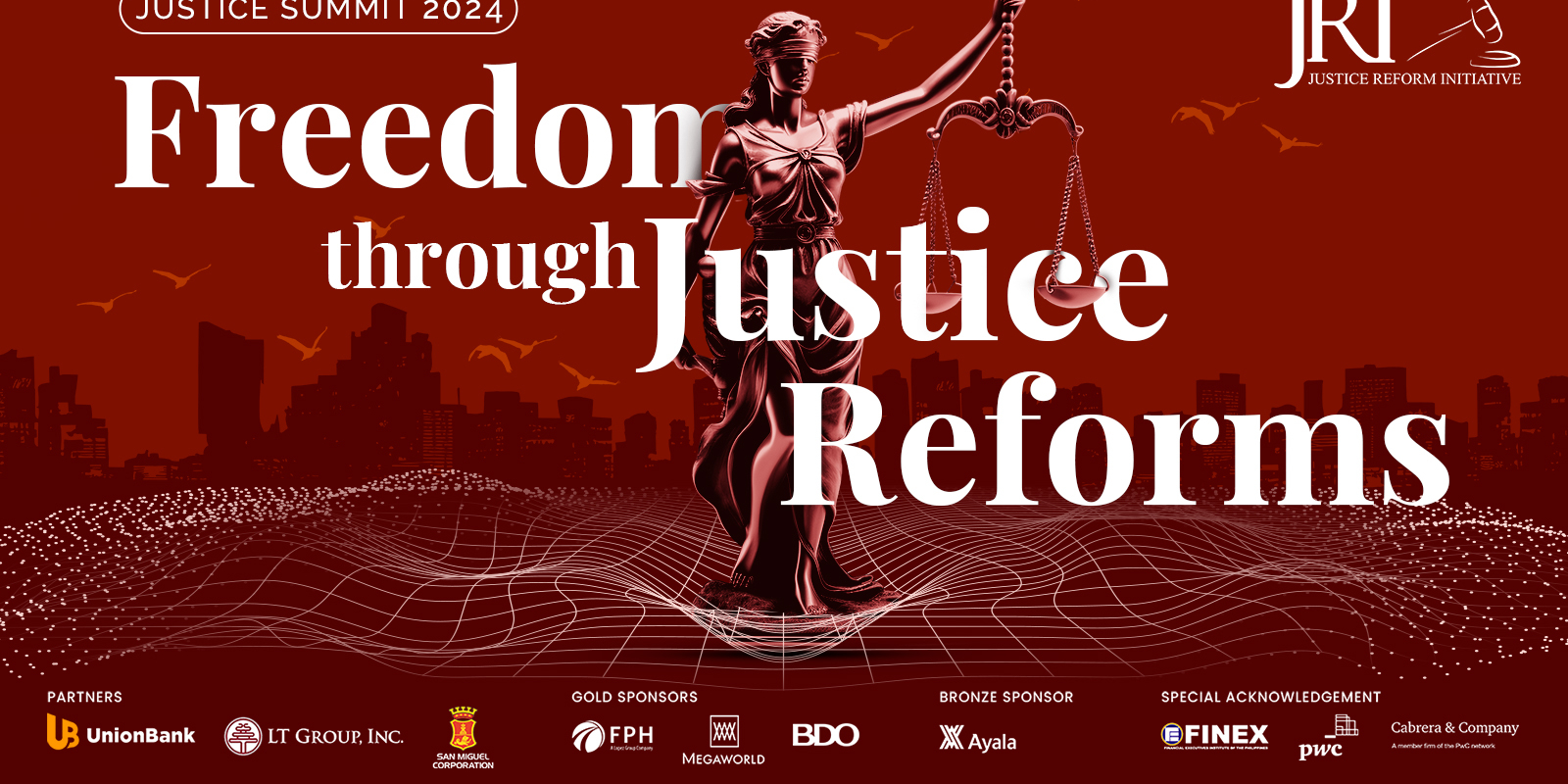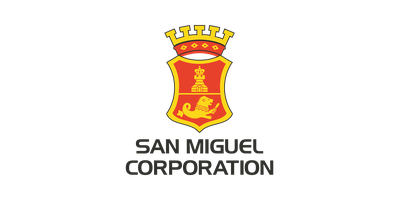The Justice Reform Initiative, Inc. in partnership with the Supreme Court of the Philippines
The SC-JRI 2024 Justice Summit
FREEDOM THROUGH JUSTICE REFORMS
01 February 2024, Makati Diamond Residences (Makati City)
Freedom and the Justice System
"Freedom is the human condition that allows an individual to develop to his or her maximum capabilities and fullest potential. It is an inherent aspiration. It is an essential personal entitlement." – Atty Santiago Dumlao, Jr.
"Our responsibility as citizens is to address the inequalities and injustices that linger, and we must secure our birthright freedoms for all people." – Barack Obama
Freedom is a concept that resonates deeply with the human spirit, yet its true manifestation often hinges on the integrity and effectiveness of justice systems. The pursuit of justice reform is not just a legal or political endeavor; it is fundamentally a quest for greater freedom. By reforming justice systems to be more equitable, transparent, and accessible, societies can move closer to the ideal of freedom for all individuals.
Peace, Justice and Strong Institutions – U.N. Sustainable Development Goal (SDG) 16
The achievement of SDG 16 targets is pivotal for developing countries like the Philippines. The goal emphasizes the importance of reducing corruption, developing effective, accountable institutions, and ensuring equal access to justice. Reforming justice systems in line with these principles is a crucial step towards liberating individuals from the shackles of injustice, discrimination, and inequality.
Justice reform plays a key role in enhancing freedom by addressing systemic issues that impede fair treatment under the law. This includes tackling corruption, which often skews the legal process in favor of the wealthy or influential, and reforming laws that disproportionately affect marginalized groups. By establishing legal frameworks that protect the rights of all citizens, particularly the most vulnerable, justice reform ensures that freedom is not just a privilege of the few but a right of the many. This aligns with SDG 16's targets of promoting peaceful and inclusive societies, providing access to justice for all, and building effective, accountable institutions at all levels. The interconnection between justice reform and freedom is evident: a just society is a foundation upon which the edifice of freedom is built.
The Strategic Plan for Judicial Innovations (SPJI) 2022-2027 of the Supreme Court of the Philippines
The SPJI, spearheaded by Hon. Chief Justice Alexander G. Gesmundo, is a comprehensive initiative designed to overhaul and modernize the nation's judiciary. It addresses persistent issues like case delays, clogged dockets, and resource shortages, exacerbated by the COVID-19 pandemic. Key problems identified include a poor court-to-population ratio, protracted litigations due to procedural rules, manual and delaying processes, and the incompetence or negligence of some court officials and employees. The plan also highlights the public's perception of inefficiency and corruption in the courts.
The SPJI operates on four guiding principles: timely and fair justice, transparent and accountable justice, equal and inclusive justice, and technologically adaptive management, and sets out to achieve three main outcomes: efficiency, innovation, and access to justice.
Key objectives include enhancing efficiency through streamlined court systems and operations, improving the welfare of court workers, and adopting innovative approaches such as AI for legal research and an updated eCourt System. It also focuses on increasing public access to legal services, strengthening legal aid, gender fairness, inclusivity, and better information and communications technology governance. This ambitious plan aims to make the Philippine judicial system more responsive, transparent, and efficient, ensuring greater access to justice for all.
Business Perspectives on the Rule of Law and Access to Justice
The rule of law is a foundational element for business development and investment, providing a predictable and stable legal framework essential for economic activities. When the rule of law is firmly established, it ensures that laws are applied uniformly and fairly, creating an environment where businesses can operate with confidence. This legal predictability is crucial for business planning and decision-making.
The rule of law also reduces the risk associated with investments because investors are more assured of the protection of their rights, including property rights and the ability to enforce contracts. Investors are more likely to commit their resources in a country or jurisdiction where the legal system is transparent, impartial, and effective. Therefore, the rule of law not only fosters an environment conducive to business development and domestic investment but also plays a pivotal role in attracting foreign investment, thereby fueling broader economic progress.
Access to justice, on the other hand, is crucial for businesses as it ensures a fair and predictable legal environment where contractual and property rights are enforced, thereby fostering investor confidence and economic stability. It also provides a mechanism for resolving disputes efficiently and fairly, which is essential for maintaining a level playing field and promoting healthy competition in the market.
The Justice Reform Initiative (JRI)
The JRI is a private sector umbrella group composed of leading business organizations, judicial advocacy groups and foreign chambers of commerce in the Philippines. Its main purpose is to serve as the voice of business in pushing for reforms in the administration of justice, which is critical to sustainable economic growth, global competitiveness and the promotion of an investment-supportive environment as well as social justice.
Since its inception in 2015, the JRI has undertaken significant activities to advocate for judicial reform in the Philippines. Key initiatives include regular meetings with the sitting Chief Justices and representatives of the Supreme Court, the Philippine Judicial Academy, and the Judicial Integrity Board (JIB). JRI supported the operationalization of the JIB and the Supreme Court's 5-year Strategic Plan for Judicial Innovations.
JRI has also backed legislative reforms, such as the creation of judicial marshalls and the expansion of first-level courts' jurisdiction. Actively participating in various forums and research studies on topics like the Revised Corporation Code and international justice system studies, JRI has been vocal in issuing public statements in alliance with other business organizations on various judicial issues, including jail decongestion and the protection of civil liberties.
This 2024 Justice Summit is the biggest joint undertaking of JRI and the Supreme Court. A public perceptions survey was carried out in Q3 2023 in collaboration with PricewaterhouseCoopers (PwC) Philippines to determine the key issues relating to the judicial system. The emerging survey themes were discussed and deliberated at consultative workshops with key stakeholders held in November 2023 and January 2024. The summary insights and recommendations from the workshops will be presented at the Summit, and no less than the Chief Justice of the Philippines Hon. Alexander G. Gesmundo will share his call to action and perspectives on how these insights and recommendations can help achieve the aspired outcomes of the SC Strategic Plan for Judicial Innovations.
Freedom Through Justice Reforms
Freedom through justice reform is pivotal for businesses as it lays the groundwork for a stable and predictable legal environment, which is a cornerstone for economic growth and investment. When justice systems are reformed to be fair, transparent, and accessible, they create an ecosystem where businesses can thrive, secure in the knowledge that their rights and contracts will be upheld. This level of certainty is crucial for attracting both domestic and foreign investments, fostering innovation, and encouraging entrepreneurship. By ensuring that the legal framework is equitable and efficient, justice reform directly contributes to creating a vibrant and dynamic business environment, where companies can operate with confidence and without the fear of arbitrary legal challenges or corruption.
Moreover, the concept of freedom through justice reform extends beyond mere economic considerations, as it also encompasses the principles of corporate responsibility and ethical business practices. In a reformed justice system that promotes fairness and inclusivity, businesses are more likely to engage in practices that are socially responsible and environmentally sustainable. This not only enhances their reputation and brand value but also contributes to the broader social good. In essence, freedom through justice reform is not just a legal imperative but a holistic approach that integrates economic prosperity with social and environmental stewardship, paving the way for sustainable development and a more equitable society.
****************
Quotes from the Second Plenary Council of the Philippines (January 20 – February 17, 1991)
"The greatest problem of our country today is not poverty. It is injustice."
"Matitiis pa po namin ang walang sapat na pagkain araw-araw, ngunit ang hindi kami mabigyan ng katarungan ay higit na mas masakit pa." (Translation: "We can endure not having enough food every day, but not being given justice is even more painful.")


















